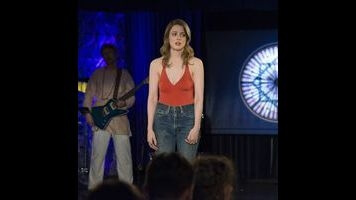Mickey and Gus exist in an odd plane as characters in this first episode. They can both be cartoonish, especially Rust who is all angles and awkwardness. He plays purposefully big, showing enthusiasm for all the wrong things. While Jacobs’ Mickey is inherently more understated as a character, she still has her moments of her ennui can feel all encompassing, and her Ambien trip is Drunk Ann Perkins level of great. It highlights either their connectedness as a characters — Gus is always on the upbeat, Mickey is always on the downbeat — or their disconnectedness. But there’s also a groundedness and a reality to Gus and Mickey’s general dissatisfaction with where they are in their lives. When Gus sits around his shitty apartment, he is not the throws of devastation, he’s simply just sad and bored. Mickey’s monologue on the stage at Bliss — my favorite moment of the episode — perfectly sums up what so many people are thinking: Why can’t I be loved to? Why is that the random Facebook friend gets marital bliss when I want the same thing?
The episode is a run up to this fucked up meet-cute, laying the groundwork for who Mickey and Gus are as people separately before they get into who they are as a couple together. They begin their stories in a similar ways, dumped. But they ways in which they deal with those situations are so different. Gus was delusionally happy with the life he once he had, Mickey is perpetually dissatisfied, settling for a man she should not be with because he buy can’t buy pants without his mother and knows it. They both want to hang on, but Mickey does that by continuously following her deadbeat ex around even though she knows it’s bad for her, while Gus decides to accept this new freedom by remaking his life as the type of guy who has an orgy. Although not an orgy involving sisters. The failed orgy is Bliss House monologue: Life on the other side of a relationship is not what he hoped or expected it to be.
But it’s tough to introduce these character at what is supposedly their worst. These are two people we have to root for to continue watching or there is no point of watching their romance grow. They may not be happy shiny people, but there needs to be reason why their happiness is something that we as an audience are excited to see, and I’m not sure this episode is enough of a springboard for that. Take Gus, who is the consummate nice guy, but it’s his ex that points out the fatal flaw: He’s too nice, and that’s bothersome. It’s like the How I Met Your Mother episode “Spoiler Alert” when the glass breaks every time the characters are made aware of someone’s fatal flaw. Hear it once and the fantasy is ruined. What this episode is though is enough of a reason to see why and how the way that they are. Apatow, Arfin, and Rust went with the more difficult route, not the easy one, and they should be praised for trying something different, for traveling on a rom-com path not often taken, something else Apatow has done in his career, whether it be through unexpected pregnancy with a one night stand or a middle-aged virgin. But in those instances, we were given enough of a reason to like the protagonists at the beginning. These characters aren’t unlikable, they’re just not likable either. In a way, it has aspects of the first act of movie rom-com. The only difference is the movie will go straight into the second act without giving the audience the choice of not watching what comes next. Netflix just happens to have the format that makes going into the next episode that much easier.
One of the more affable aspects of the first episode, though, is the tapestry of characters that will come in and out of Mickey and Gus’ life as they go about falling for each other, including Mickey’s Australian roommate and Gus’ buds. But the characters I was most interested in and wanted to see more of was the neighbors. Kerri Kenney’s (Reno 911!) Ambien-doling mom and Freaks And Geeks alumni Dave “Gruber” Allen and Steve Bannos as the two best friends/roommates who live in Gus’ apartment complex. It’s these types of characters that give Love a texture that will keep it interesting.









































